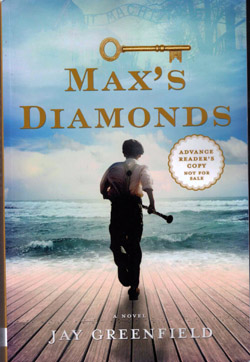Max’s Diamonds by Jay Greenfield; © 2016; Chickadee Prince Books; 385 pages; ISBN 978-0-9913274-2-3; $15.99
By Donald H. Harrison

 SAN DIEGO –Paul Hartman is incredibly bright, extraordinarily calculating, and horribly conflicted about the diamonds that his cousin, Max, a survivor of Auschwitz, conferred upon his family before he committed suicide. Even as a boy, Paul understood that the diamonds were ill-gotten and he wanted nothing to do with them. In fact, he threw into the ocean near his home in Arverne, Queens, the key to a safe deposit box in which some of Max’s diamonds were stashed .
SAN DIEGO –Paul Hartman is incredibly bright, extraordinarily calculating, and horribly conflicted about the diamonds that his cousin, Max, a survivor of Auschwitz, conferred upon his family before he committed suicide. Even as a boy, Paul understood that the diamonds were ill-gotten and he wanted nothing to do with them. In fact, he threw into the ocean near his home in Arverne, Queens, the key to a safe deposit box in which some of Max’s diamonds were stashed .
But there were plenty more diamonds that Max somehow had smuggled into the country, and Paul’s mother had no such reservations about keeping the loot for herself and for her new boyfriend, nor about using some of it to pay for Paul’s very fine education at Columbia University and Harvard Law School.
Later, chosen to clerk for a federal judge, thanks to an education paid for with illegal diamonds, Paul cannot put the past behind him. When relatives ask him to reveal what the judge may decide in a case that will impact a German industrial giant, and thereby affect the value of its stock, Paul knows he is duty-bound not to tell them. But perhaps, to help them pay off his debts, he can lead them to some of the diamonds. The German manufacturer literally worked Jewish slave laborers to death during World War II, and although it is unethical even to be involved in the case, much less in helping to write the much-awaited opinion, Paul feels he has a score to settle.
Even in his recreation, the Holocaust is never far from Paul’s tortured conscience. He is attracted to women who are classical musicians, especially flutists, who often are called upon to perform the music of pre-Nazi Jew-hater Richard Wagner.
Whether because of guilt or genes, Paul is driven to work harder and smarter than anyone else – especially the snobbish Gentile attorneys whom he despises all the while wanting their acceptance. His slavish attention to work eventually spells trouble for his first marriage. Work, work, makes him “successful” in terms of financial reward, but not in being able to sustain a meaningful relationship.
An important episode in the book comes when Paul finally learns the awful secret of where the diamonds came from and how Max was able to obtain them. I’ll not spoil this part for mystery-loving readers, except to say that the answer is shocking.
The novel does not end with this denouement because author Greenfield didn’t intend to write a “whodunit” or even a “howdhedoit” – his intent, carried out quite successfully, was to explore how family members and close friends of Holocaust Survivors, even those who lived safely in faraway America, were victims in the second degree of the Holocaust, less so than children of Survivors, but victims nevertheless.
The novel is scheduled to make its debut in May.
*
Harrison is editor of San Diego Jewish World. He may be contacted via donald.harrison@sdjewishworld.com Comments intended for publication in the space below must be accompanied by the letter writer’s first and last name and by his/ her city and state of residence.
Pingback: Another Great Review for Max’s Diamonds – Chickadee Prince